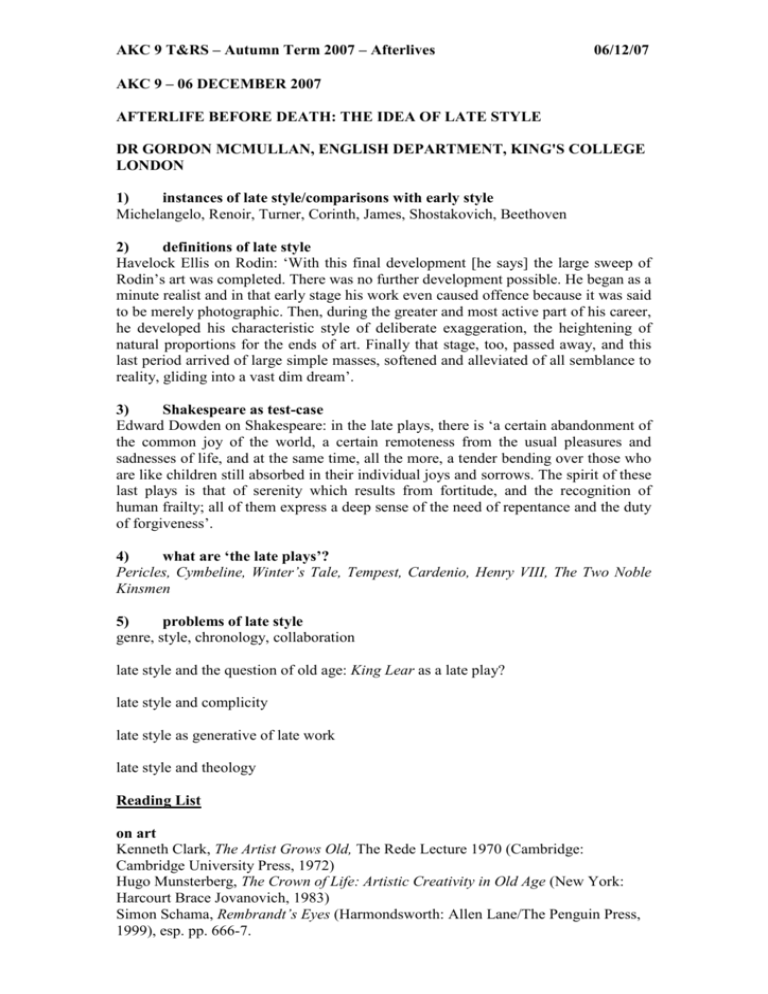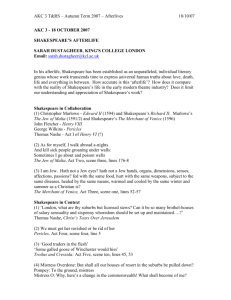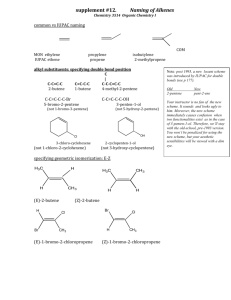afterlife before death: the idea of late style
advertisement

AKC 9 T&RS – Autumn Term 2007 – Afterlives 06/12/07 AKC 9 – 06 DECEMBER 2007 AFTERLIFE BEFORE DEATH: THE IDEA OF LATE STYLE DR GORDON MCMULLAN, ENGLISH DEPARTMENT, KING'S COLLEGE LONDON 1) instances of late style/comparisons with early style Michelangelo, Renoir, Turner, Corinth, James, Shostakovich, Beethoven 2) definitions of late style Havelock Ellis on Rodin: ‘With this final development [he says] the large sweep of Rodin’s art was completed. There was no further development possible. He began as a minute realist and in that early stage his work even caused offence because it was said to be merely photographic. Then, during the greater and most active part of his career, he developed his characteristic style of deliberate exaggeration, the heightening of natural proportions for the ends of art. Finally that stage, too, passed away, and this last period arrived of large simple masses, softened and alleviated of all semblance to reality, gliding into a vast dim dream’. 3) Shakespeare as test-case Edward Dowden on Shakespeare: in the late plays, there is ‘a certain abandonment of the common joy of the world, a certain remoteness from the usual pleasures and sadnesses of life, and at the same time, all the more, a tender bending over those who are like children still absorbed in their individual joys and sorrows. The spirit of these last plays is that of serenity which results from fortitude, and the recognition of human frailty; all of them express a deep sense of the need of repentance and the duty of forgiveness’. 4) what are ‘the late plays’? Pericles, Cymbeline, Winter’s Tale, Tempest, Cardenio, Henry VIII, The Two Noble Kinsmen 5) problems of late style genre, style, chronology, collaboration late style and the question of old age: King Lear as a late play? late style and complicity late style as generative of late work late style and theology Reading List on art Kenneth Clark, The Artist Grows Old, The Rede Lecture 1970 (Cambridge: Cambridge University Press, 1972) Hugo Munsterberg, The Crown of Life: Artistic Creativity in Old Age (New York: Harcourt Brace Jovanovich, 1983) Simon Schama, Rembrandt’s Eyes (Harmondsworth: Allen Lane/The Penguin Press, 1999), esp. pp. 666-7. AKC 9 T&RS – Autumn Term 2007 – Afterlives 06/12/07 on music Theodor W. Adorno, Beethoven: The Philosophy of Music. Fragments and Texts, ed. Rolf Tiedemann, trans. Edmund Jephcott (Cambridge: Polity, 1998; first published in German, 1993) Maynard Solomon, Late Beethoven: Music, Thought, Imagination (Berkeley and Los Angeles: University of California, Press, 2003) Rose Rosengard Subotnik, ‘Adorno’s Diagnosis of Beethoven’s Late Style: Early Symptom of a Fatal Condition’, Journal of the American Musicological Society 29 (1976), 251-53 on Shakespeare H. B. Charlton, Shakespearian Comedy (London: Methuen, 1938), Edward Dowden, Shakspere: A Critical Study of his Mind and Art (London: Henry S. King, 1875) John Porter Houston, Shakespearean Sentences: A Study in Style and Syntax (Baton Rouge: Louisiana State University Press, 1988) Cyrus Hoy, The Hyacinth Room: An Investigation into the Nature of Comedy, Tragedy, & Tragicomedy (London: Chatto & Windus, 1964) Marco Mincoff, Things Supernatural and Causeless: Shakespearean Romance (Newark: University of Delaware Press, 1992; first published Sofia, 1987) Kenneth Muir, Last Periods of Shakespeare, Racine, and Ibsen (Liverpool: Liverpool University Press, 1961) Russ McDonald, Shakespeare’s Late Style (Cambridge: Cambridge University Press, 2006) Gordon McMullan, Shakespeare and the Idea of Late Writing: Authorship in the Proximity of Death (Cambridge: Cambridge University Press, 2007) Cynthia Marshall, Shakespearean Eschatology: Last Things and Last Plays (Carbondale and Edwardsville: Southern Illinois University Press, 1991) Simon Palfrey, Late Shakespeare: A New World of Words (Oxford: Clarendon Press, 1997) C. J. Sisson, The Mythical Sorrows of Shakespeare, Annual Shakespeare Lecture of the British Academy, Proceedings of the British Academy, Vol. 20 (London: Milford, 1934) on late style in general Hermann Broch, ‘The Style of the Mythical Age,’ introductory essay to Rachel Bespaloff, On The Iliad, trans. Mary McCarthy (New York: Pantheon, 1947) Havelock Ellis, Impressions and Comments, Third Series, 1920-1923 (Boston: Houghton Mifflin, 1924) Michael Millgate, Testamentary Acts: Browning, Tennyson, James, Hardy (Oxford: Clarendon Press, 1992) Karen Painter and Thomas Crow (eds), Late Thoughts: Reflections on Artists and Composers at Work, Issues and Debates 14 (Los Angeles: Getty Publications, 2006) Edward Said, On Late Style (London: Bloomsbury, 2006) Full details about the AKC course, including copies of the handouts, can be found on the AKC website at: http://www.kcl.ac.uk/akc. If you have any queries please contact the AKC Course Administrator on ext 2333 or via email at dean@kcl.ac.uk. Please make a note in your diary that the AKC Examination will take place on Monday 21 April between 14.30 and 16.30. If you haven’t done so already YOU MUST REGISTER FOR THE COURSE using the form on the website. You will need to register for the exam separately, information will be provided next semester.








